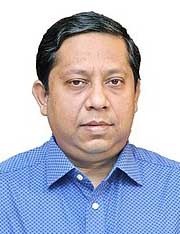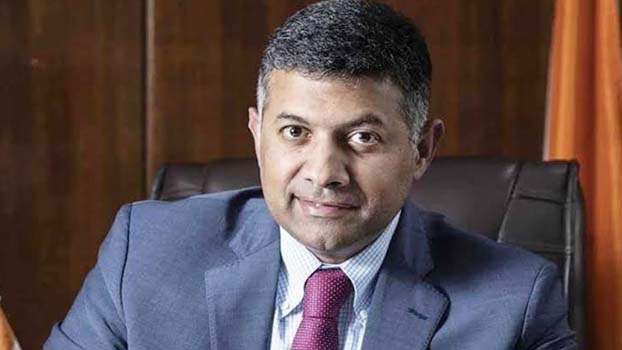Vikram Doraiswami – the new gentleman in town

The newly appointed Indian High Commissioner Vikram Kumar Doraiswami made his presence felt well before his arrival. Being possibly the first envoy to take the land route instead of the aerial one to arrive at his new station, his arrival was already a talk of the town by the time he reached. It may well have been the temporary suspension of air communication between the two neighbors due to ongoing COVID-19 pandemic that prompted him to take the land route, its significance was elsewhere. It was the corridor he chose.
With India on three sides of Bangladesh, the options available to him were plenty, but he chose Tripura. This is important as Tripura is the new frontier to take the economic cooperation between these two vibrant economies to newer heights. While Bangladesh land corridor offered to India has helped inject new vibrancy into the economy of this otherwise hard to assess region of India, Bangladesh is also expected to benefit from this in a number of ways.
Exporting Indian goods made in Bangladesh back to Tripura and beyond is one such prospect. Mr. Doraiswami’s first formal entry into Bangladesh as the envoy of his country through the Agartala-Akhaura corridor therefore generates a different vibe.
However this probably has greater significance. Tripura is inseparable from the liberation war of Bangladesh. Not only this Indian state welcomed more Bangladeshi refugees that it’s very own population in 1971, this particular border is also witness to many fiercely fought battles during those nine months.
An important reason, apart from many others being the fact, is that the Pakistanis tried frantically to take this Indian state capital as a bargaining chip for future negotiations. No wonder the Bangladesh government has also chosen this area for erecting a monument in remembrance for the fallen Indian war heroes of 1971. Therefore, the route that Mr. Doraiswami chose surpasses the newly rediscovered importance of the region in our bilateral ties, but goes on to demonstrate his deep understanding of the warmth and depth of our bilateral relationship.
The emergence of Bangladesh was not just the liberation of yet another former British colony, it was much beyond that. Bangladesh stands against every logic that tries to justify the unfortunate partition of India and the creation of a failed state called Pakistan in 1947. Bangladesh was created on the basis of Bangabandhu’s philosophy of a secular country where every religion, large or small, will enjoy equal rights and freedom and religious practices protected by the state, but with religion having no say whatsoever in the day to day business of the country and governance.
This is perhaps the reason why Indira Gandhi’s government had no hesitation in allowing 10 million Bangladeshi refugees, mostly Muslims, to cross the international border into India unopposed, without any way of knowing that they would stay there for less than a year and not years together like the Rohingyas in today’s Bangladesh.
Therefore the unanimous and unparalleled support that Indira Gandhi’s ruling Congress and opposition BJP extended to Bangladesh in 1971, was not just to mitigate the sufferings of the Bengali populous in the hands of the Pakistanis in the name of Islam, but collectively Bangabandhu and Indira Gandhi succeeded in nullifying the hypothesis of religion-based statehood to the world as well as to the generations to come. Anyone who is ignorant of this very spirit of the deep rooted Indo-Bangla ties is bound to be confused with the flower vase with printed portrait on it and end up in scoring fouls and not goals.
Mr. Doraiswami’s arrival and subsequent public appearances tempt me to believe that he is well appreciative of this very essence of our bilateral ties. It is not only the route he chose, but also his first destination in Dhaka, that makes me think and write this way. It was Bangabandhu Memorial Museum in Dhanmondi, where he made a stopover on his journey from Agartala to Baridhara to pay his humble tribute to the Father of the Nation of Bangladesh and one of the finest statesman the world has ever known, keeping in mind that this museum in no way comes on his chosen route.
My first opportunity of meeting him was rather by chance. It was a formal lunch hosted in honour of the visiting Indian External Affairs Minister Mr. Jay Shanker, where he happened to be seated in the same table with me and my wife.
He was then visiting Dhaka as a member of the Indian Minister’s entourage. I experienced the warmth and passion of the son of an Indian war veteran of 1971 for Bangladesh in him during that brief lunch encounter. His father served with the Indian Air Force and directly participated in the war of our liberation in the Western front. My opinion towards Doraiswami remains unchanged following our second meeting recently.
This time it was at the spacious, modern office of the Indian High Commissioner to Bangladesh, a room that continuously kept me reminding of the vastness of the expectations and the enormousity of the challenges that this gentleman will be experiencing in the coming years. As I walked out of his office, with my taste buds still charmed by soothing taste of the nankhatai that he had offered me during our just concluded meeting, I remained equally charmed by his commitment and understanding of his responsibility that I had just re-experienced.
Professor Dr. Mamun Al Mahtab (Shwapnil) is Chairman, Department of Hepatology Bangabandhu Sheikh Mujib Medical University& Member Secretary, Sampritee Bangladesh



